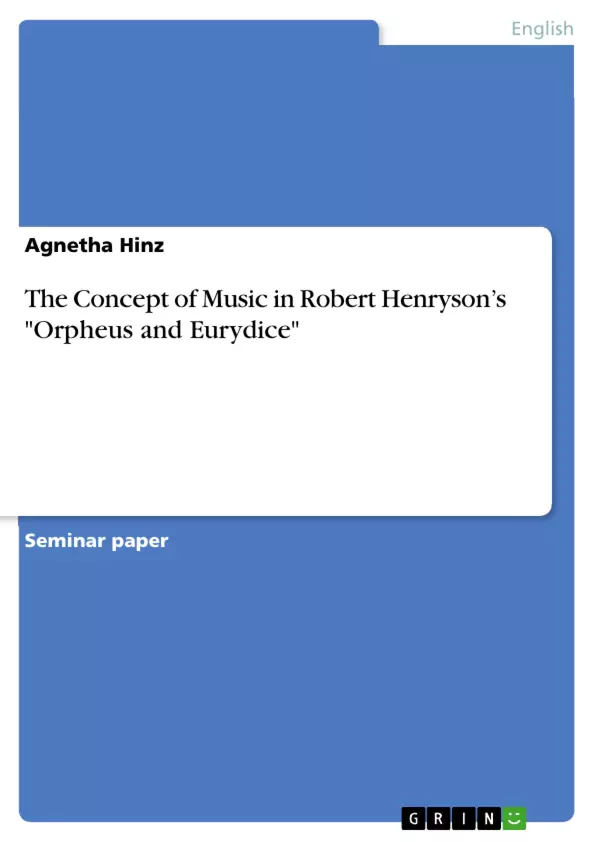“Music, through the sweetness of its melody, brings pleasure and comfort to the soul.” This citation by Nigel Wilkin in “Music in the Age of Chaucer” ascribes a special own form of power to music; the power to affect someone’s soul. Also in the poem of Orpheus and Eurydice by the Scottish poet Robert Henryson , music plays a decisive role and implies a special power to the protagonist. The poem, which approximately was written in the late fifteenth century, leans on the Greek myth of Orpheus.
King Orpheus, who is introduced as the grandson of Memoria and Jupiter, the son of the “michty god Phebuss“ and the muse Caliope, “that madin mervalouss,/ The ferd sistir, of all musik maistress“, gains his bond to music through his mother’s milk, quod vide “gart him souk of hir twa paupis quhyte/ The sueit lecour of all musik perfyte“.
Henryson describes Orpheus as “fair and wyse,/ Gentill and gud, full of liberalitie”. His “noble fame“ was extensive, so that the queen of “Trace”, called Eurydice, heard about him, too. They get married and live their life full of happiness, pleasure and enjoyment.
Table of Contents
- Introduction
- The concept of music
- Music in the Middle Ages
- Music in Orpheus and Eurydice
- Conclusion
Objectives and Key Themes
This research paper examines the concept of music in Robert Henryson's "Orpheus and Eurydice." It explores the significance of music in the Middle Ages, particularly as it relates to the poem's narrative and themes. The paper aims to provide a comprehensive analysis of how music functions as a powerful force in the story, influencing the characters' actions and shaping the overall meaning of the poem.
- The role of music in medieval society
- The power of music to affect the soul
- The symbolic significance of music in literature
- The relationship between music and the natural world
- The impact of music on human emotions and behavior
Chapter Summaries
The introduction explores the power of music to affect the soul, setting the stage for an analysis of music's role in Robert Henryson's "Orpheus and Eurydice." The first chapter delves into the concept of music in the Middle Ages, examining its theoretical framework, practical uses, and symbolic significance. The second chapter focuses on the specific role of music in "Orpheus and Eurydice," analyzing how Henryson uses music to enhance the narrative and develop key themes.
Keywords
Medieval music, Robert Henryson, "Orpheus and Eurydice," music and literature, music and the soul, music and the natural world, music and human emotions, medieval culture, linear conception, rhyme royal stanza, moralitas.
Frequently Asked Questions
What is the central role of music in Henryson’s "Orpheus and Eurydice"?
Music is depicted as a powerful force capable of affecting the soul, bringing comfort, and influencing the narrative's outcome.
How did Orpheus gain his musical abilities in the poem?
According to Henryson, Orpheus gained his bond to music from his mother, the muse Calliope, described as the mistress of all music.
How was music perceived in the Middle Ages?
The research paper explores the medieval theoretical framework where music had symbolic significance and was believed to have a direct impact on human emotions and the natural world.
What is the "moralitas" in Robert Henryson's poem?
The paper discusses the moralitas, a traditional concluding section in medieval poems that provides a moral interpretation of the story.
Does the poem follow the original Greek myth?
Yes, it leans on the Greek myth but adapts it to the cultural and literary context of 15th-century Scotland.
- Quote paper
- Agnetha Hinz (Author), 2012, The Concept of Music in Robert Henryson’s "Orpheus and Eurydice", Munich, GRIN Verlag, https://www.grin.com/document/302899



